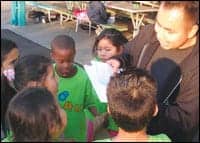 |
Many health care professionals would say that they are deeply committed to their work, but would they jump out of a plane to prove it? If you are one of those who would answer “yes,” then strap on a parachute and join the program directors of 024U, an after-school environmental-health education program aimed at teaching kids about the health effects—and hands-on solutions—of air pollution and related respiratory illnesses.
On April 26, 2008, Julia Robinson-Shimizu, director of communications and marketing at Breathe California of Los Angeles County (Breathe LA), and Nicole Cavalino-Maguire, 024U program coordinator, will be participating in a charity sky dive to raise money and awareness for Breathe LA and its programs, such as 024U.
Shimizu says that jumping out of a plane really makes a statement about their commitment to clean air. “We’ll do whatever it takes.”
Breathe LA, Since 1903
Breathe LA is a nonprofit organization with a long history of helping Los Angeles residents. The organization has gone through many name changes over the years, but it originally began as the Los Angeles Society for the Study and Prevention of Tuberculosis, aiding the community in a 1903 Los Angeles tuberculosis outbreak. It eventually became the American Lung Association of Los Angeles County, but that affiliation ended in 2005.
Breathe LA’s mission is to promote clean air and healthy lungs through research, education, and technology; 024U, one of its education components, began in 2004.
The 024U program is funded through a variety of grant sources, including the Los Angeles chapter of Rotary Foundation International and local Los Angeles TV station, KTLA, through the Chicago-based McCormack Tribune Foundation.(Tribune Broadcasting, the owner of KTLA, largely supports the Foundation.)
Introducing the New 024U
024U has been an after-school educational program since 2004, but Maguire has recently completed re-envisioning the curriculum.
She says, “It was a great program for where it started, but when we got our feedbacks from our actual [after-school] sites, they were requesting more of a train-the-trainer background with support from our organization.”
024U’s previous version consisted of interns conducting educational presentations with a limited 12-page booklet. Site facilitators had little training, participation, flexibility, or creative input.
Over the past several months, Maguire has used her background in kinesiology and pedagogy motivation to create a dynamic, flexible, interactive after-school program that incorporates the individual needs of the facilitators and their sites.
In addition, the earlier 12-page booklet has blossomed into a 97-page program facilitator guide and a separate 30-page illustrated activity booklet for the kids.
The structure is now less dependent on interns. Instead, Maguire will be directly working with the after-school program’s facilitators, who will then use 024U’s exercises and materials within their program.
Maguire explains, “What I’ll be doing is teaching the facilitators the actual program, giving them an idea of what the hands-on activities are, the background, and then they go to their sites and implement them in accordance with the other activities that they have going on.” Maguire may still be at the site during the program’s implementation, but will act in a more supportive role.
Currently, 54 sites are registered with the 024U program, which is targeting after-school children, ages 8 to 14.
Six Modules
Maguire’s new 024U facilitator’s guide is divided into six modules that cover a broad spectrum of environmental health topics with 35 or so complementary activities, ranging from crossword puzzles to making natural, clean-air cleaning products.
For example, the pollution module explains the sources of different types of pollution, both indoor and out, and then goes into health effects and air quality.
Once the basic information is presented, facilitators can delve into how kids can change their own lives and recognize and improve air quality in their homes and schools.
Maguire says, “We also explain how other kids have become very active nationwide on changing air pollution and how they’re really making an impact on it and themselves.”
Other topics focus on how kids can recognize and apply the R’s of recycling: Recycle, Reuse, and Reduce materials, such as packaging, and using more reusable grocery bags.
Another section focuses on alternative and renewable fuels with some “I-Spy” like activities, where kids can look for hybrid cars that drive past the playground.
Maguire recognizes that educating kids about hybrid technology and alternative energy products may be complicated for the kids and even for some adults. Nevertheless, she believes it is important to introduce these concepts.
“It’s good to get the idea out so kids realize that there are alternatives and other ways of using fuel. In their generation, they’re probably going to use them a lot more than we do,” she says.
The Activities
The children’s activity guide corresponds directly with the facilitator’s guides, although the facilitators are privy to more information.
“We want to make sure the facilitators are prepared before they go in front of their kids and the kids start asking crazy questions,” Maguire says.
Maguire believes that word-based exercises such as fill-in-the-blanks and crossword puzzles not only help students with their reading and writing, but also allow them to bring those new words home.
She says, “That way, they’re actually owning their terms, and they’ll be able to use them and be comfortable with them in a fun sort of way.”
Facilitator guides focus more on the hands-on activities. For example, the first module on pollution gives facilitators a scavenger hunt game that has the kids go through their playground and find the things that can be recyclable or reusable or a resource that can affect the environment and air pollution. It is hoped that the awareness at the playground will lead the kids to being aware of the home’s indoor environments.
The module is flexible enough that each site can tailor their scavenger hunt to their community. For example, an urban site may not have the same scavenger hunt list of buildings or building materials as a residential suburban location.
Maguire says, “This way, they’re actually looking at it in the first person and saying, ‘Okay, this is what I can do; this is what’s really in my community.’ It will be interesting to see what the different sites bring to it.”
Maguire also designed an asthma Bingo game that utilizes characters with asthma triggers. She hopes the game can demystify asthma, which has a high prevalence in the Los Angeles area due to air pollution from its love affair with cars.
“These days it’s a good thing to understand that even if you don’t have asthma, the kids around you may have it, and that they’re not contagious. It’s just something that is caused by our environment, most likely, so you can understand that more.”
The activities are not just educational games. In the third module, children create nontoxic chemicals for the house, using baking soda and club soda for cleaning or making castor oil soap, she says.
Maguire says, “We have a list of 10 or 15 products that you can make by just putting two or three different nontoxic chemicals together, so that kids can actually clean their environment.”
Part of the recycling module introduces kids to “The Clean Air Olympics,” which keeps kids active while still learning about recycling, reusing, and reducing. The Clean Air Olympics incorporates team sports with recyclable products.
“We do everything from relays to reusing bottles to bowling activities to basketball—and it’s always based on recycled products,” Maguire says. “So it’s really neat and really a great activity because [facilitators] can do it for several days, or do an entire Olympic day if they want to do it that way.”
Eventually, Maguire hopes to involve local Los Angeles RTs in activities and have them speak to kids about the impacts of the environment on their lung health.
In addition, related specifically to RTs, Breathe LA has its Asthma Lung Power program, an asthma management course for kids. The program was created and will be delivered by RTs, but is still in its pilot stage. RTs in the LA area wishing to participate should inform Shimizu or Maguire via the www.breathela.org “contact us” page.
Taking a Leap for 024U
If you, a friend, or family members have always wanted to jump out of a plane with a parachute for a good cause—or just for kicks—024U wants you.
Shimizu says, “Just like a walk or a run or a bike ride, anyone who’s interested in supporting Breathe LA can log on online, register, and invite their friends to support their effort for Breathe LA.”
The sky diving event is being held an hour away from Los Angeles (and about an hour from San Diego) in the scenic Elsinore Valley, home to Southern California’s largest natural lake. Any participant who raises a minimum of $500 or more will enjoy a free tandem skydive.
“We like to say that it’s a breathtaking experience,” jokes Shimizu, “but it’s also something that can truly have an impact on clean air because it funds our 024U program.”
Flying Forward
Just a few days before the Lake Elsinore sky diving event, the revamped 024U program will be launched at all 54 after-school sites on April 21, which is Earth Day 2008.
|
Learn more about other educational programs for children by seraching our Archives. |
Maguire notes that some facilities will be doing 024U for 4 weeks, while some will be doing it for 10 weeks. She says, “That’s the nice thing about the way the program is set up. Depending on their needs and what they can actually bring to it, the facilitators can really modify it in whatever way they’d like.”
Along with the training in the facilitator’s guide and games in the activity books, there are pre- and post-program tests for both the kids and the facilitators. Maguire continues to develop the program and hopes to gain valuable feedback from these tests.
“It’s important to know that they learned something from it,” says Maguire. “Also, we’ll have a questionnaire that’s ongoing per module on what the kids liked and didn’t like and what they think should be added, if there was anything that was missing. So, there’s definitely a lot of growth to it. I just hope to have it as a learning experience, and then we can move forward.”
Tor Valenza is a staff writer for RT. For further information, contact [email protected].










